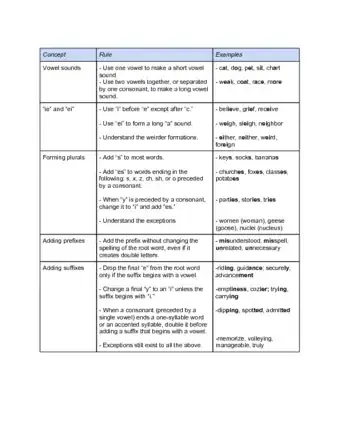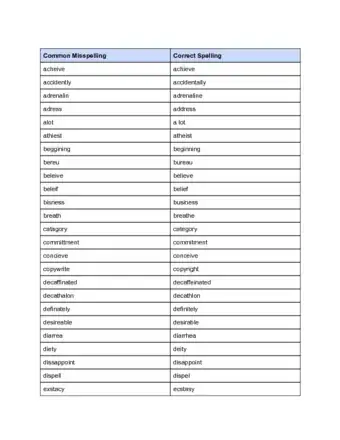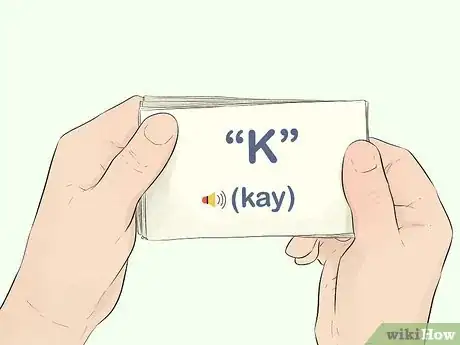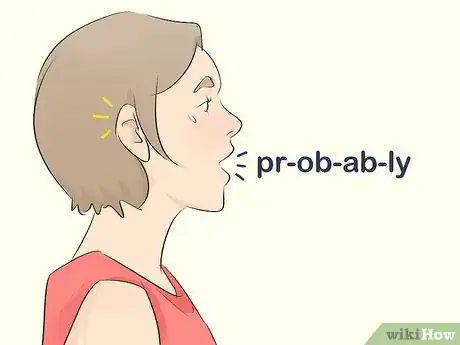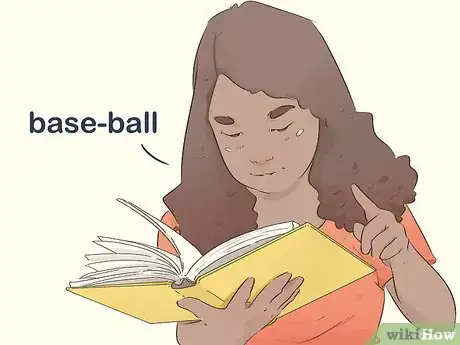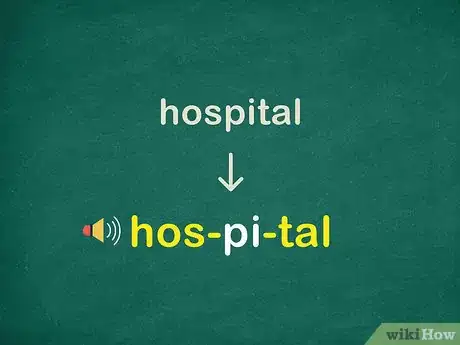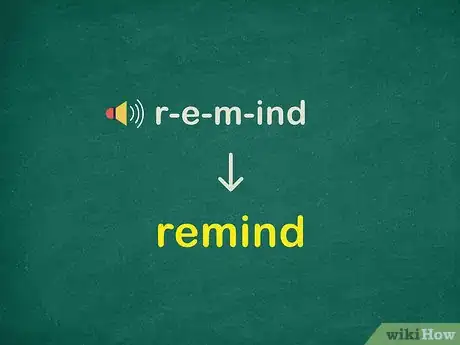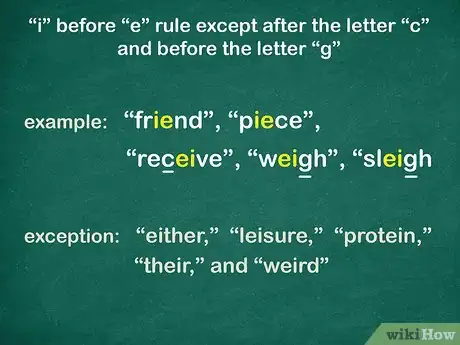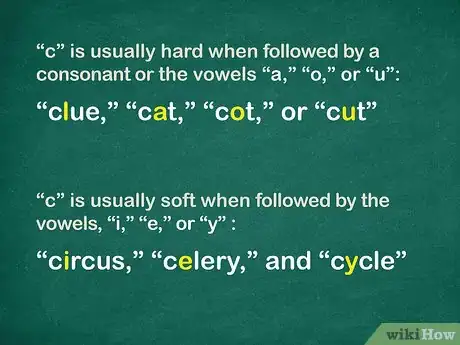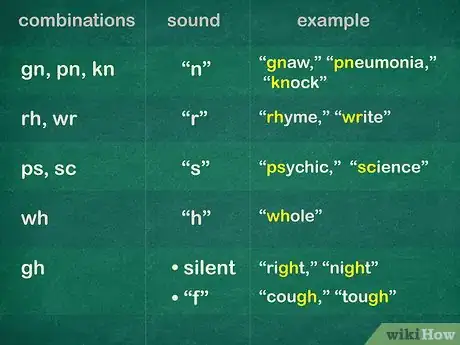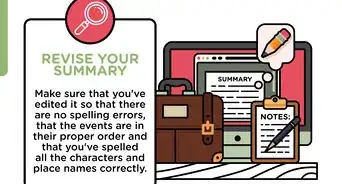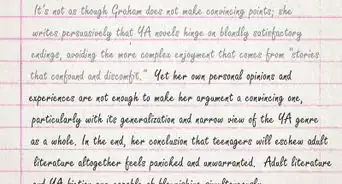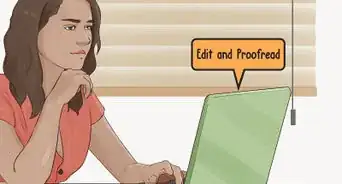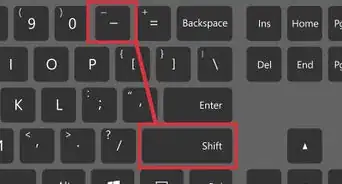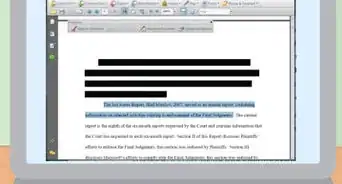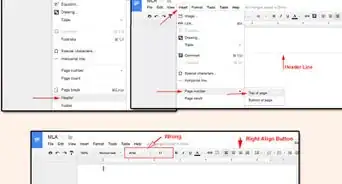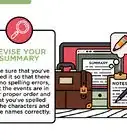This article was co-authored by wikiHow staff writer, Danielle Blinka, MA, MPA. Danielle Blinka is a Writer, Editor, Podcaster, Improv Performer, and Artist currently living in Houston, TX. She also has experience teaching English and writing to others. Danielle holds a Bachelor of Arts in English, Bachelor of Arts in Political Science, Master of Arts in English with a concentration in writing, and Master of Public Administration from Lamar University.
There are 7 references cited in this article, which can be found at the bottom of the page.
This article has been viewed 940,835 times.
Learn more...
Spelling the English language can be a challenge. It typically, however, involves nothing more complicated than memorization. You can be a successful speller if you're willing to study and practice the art and science of spelling. Reading, using a dictionary and playing online word games are all helpful. Sounding out words and breaking them into parts are good skills to develop. Learning spelling rules is important, too, but the many exceptions to those rules can be rather frustrating. In the end it comes down mainly to memorization. This article will help you with the daunting task of spelling English words.
Steps
Spelling Help
Small Words
-
1Learn the letters and sounds of the alphabet. This will allow you to recognize them when you hear them within words. Use flashcards or ask a tutor to help you connect letters to their sounds. Practice making those connections in your mind. This will help you recognize the appropriate letters when you sound out words.[1]
- Ask a family member or friend to help you learn the letter sounds.
- As an alternative you can watch videos online that show you how to say each letter. Here’s one to get you started: https://www.youtube.com/watch?v=pyKdUpJQBTY
-
2Identify the sounds as you slowly say a word you want to spell. It helps to say the word more than once.[2] Stretch out the word to help you identify each sound in it. If you say the word too quickly, you may miss a letter sound.
- If the word has more than one syllable, separate them mentally or in writing. Pronounce each syllable individually.
- For example, the word "probably" is very easy to misspell if you pronounce it "probly." Saying it slowly -- "prob-ab-ly" -- can help you hear the sounds in each syllable.
Advertisement -
3Split up each letter sound in the word to help you hear them. It's helpful to draw an underline on your paper for each sound that you hear. Don't worry about what the word is supposed to look like. Just focus on the sounds you hear when you say the word. Then think about which letter or letters might make each sound.
- It helps to count out the number of sounds in the word. For example, let's say you want to spell the word "tiger." You might hear four sounds: t-i-g-er.
-
4Spell out each sound. Write out the letter sounds you hear for each sound in the word. Then put the sounds together to form the word. Check your work by sounding out the word again while you look at your spelling, letter by letter.[3]
- For a harder word you may need to refer to the spelling rules instead of just sounding the word out.
Big Words
-
1Divide a big word into smaller words, syllables or parts. Say the word slowly, looking for smaller words within it, such as "grand" and "father" in "grandfather." If you can't find smaller words, focus on the syllables or patterns within the word. This makes it easier to spell the word, because you can more easily sound it out. You may already know how to spell the smaller words. Here are some ways to break down big words:[4]
- Break larger words into smaller words. For example, “baseball” is an example of what's known as a "compound" word: it can be broken into smaller words, in this case "base" and "ball."
- Break up non-compound words into syllables. For example, you would break up “hospital” into three syllables this way: hos-pi-tal.
- Break the word into convenient parts. For instance, “impossible” can be broken into im/poss/ible. Here you're not breaking the word into syllables, just artificial segments. The idea is to consider a longer word in shorter sections just so the task of spelling it becomes a bit easier.
-
2Look for a prefix to make spelling easier. A prefix is a short series of letters that can be added to the beginning of a word to change its meaning. The spelling of a prefix never changes, so just memorize its spelling.[5] Here are the most common prefixes:[6]
- Mis, as in “misspell”
- Dis, as in “disagree”
- Un, as in “unlikely”
- Re, as in “rewrite”
- Anti, as in “antifreeze”
- De, as in “dehydrate”
- Non, as in “nonsense”
- Fore, as in “forecast”
- In, as in “injustice”
- Im, as in “impossible”
- Note that most of these prefixes mean "not."
-
3Notice whether the word has a suffix. A suffix appears at the end of a word and changes its meaning. The spelling of a suffix never changes, so memorize it. Here are the most common suffixes:[7]
- Ed, as in “spelled”
- Ing, as in “spelling”
- Ly, as in “likely”
- Ful, as in “beautiful”
- Able, as in “comfortable”
- Ible, as in “possible”
- Er, as in “higher”
- Ment, as in “enjoyment”
- Ness, as in “happiness”
- Est, as in “biggest”
-
4Spell out each part of the word, and then put them all together. If you know how to spell smaller words or segments within the word, such as a prefix, spell those first. Then look for common letter patterns, and sound out each segment to help you spell them. Write out the letters you hear.
- Check your spelling by sounding out the word. Would the spelling you’ve used sound right?
- For example, when spelling "remind," you could break it down into "re" and "mind." If you know how the prefix "re" is spelled, write that first. Then you just need to spell "mind." If you aren't sure how to spell it, you could sound out "mind" as "m" and "ind." Then select the letters as you hear them.
Spelling Rules
-
1Recognize that some spelling rules have exceptions. English is a tricky language, because many of the rules have exceptions. Certain spellings simply don't follow the rules. However, knowing the rules will help you most of the time.[8]
- While it helps to know the exceptions, don’t try to learn them all at once. If you absorb them gradually, they won't seem so frustrating.
- Your best bet is simply to memorize the spellings that don't conform to the rules.
-
2Remember the general rule that "i" precedes "e" much of the time except when they follow the letter "c." This well-known rule pertains to words such as die, friend, yield, patient, convenience, piece and receive (where "ei" follows "c.") Unfortunately, there are many words that disobey this rule, such as weight, height, sleigh and reins. When the rules fail, you're left with memorization.[9]
- If the i/e combination is followed immediately by a "gh" (as in weight or height), the "e" precedes the "i." It's another exception you simply have to memorize.
- A few other words to memorize (that don't follow the "i before e" rule) include “either,” "neither," “leisure,” “protein,” “their,” and “weird.”
-
3Pay attention to other double vowels. Remember the rhyme, “When two vowels go walking, the first one does the talking.” When two vowels are next to each other, often you pronounce only the first vowel. This makes it easier to place two vowels in the right order. (Of course, you have to remember that two vowels are called for in this case.)[10]
- For example, you hear the “o” sound in the word “coat,” so you know the “o” comes first. You hear the “e” sound in “mean,” so you put the “e” first.
- Once again there are exceptions to this rule that you will need to memorize, such as “you,” “great,” and “phoenix.”
-
4Learn the “c” sound patterns. The letter “c” can be pronounced hard, as in “cat,” or soft, as in “cell.” Usually if the letter following the "c" is "a," "o," "u" or a consonant, the "c" is hard. Examples include cat, cot, cut, cute and clue. If the following letter is "e," "i" or "y," the "c" is usually soft. Examples include celery, citation and cycle.[11]
-
5Look for consonant letter combinations where one letter is silent. English words sometimes have a letter that is silent, typically a consonant next to another consonant at the beginning of a word. Here are common letter combinations where one letter is silent:
- Gn, pn, and kn: These letter combinations all have an “n” sound. The other letter is silent. Examples are "gnaw," "pneumonia" and "knock."
- Rh and wr: Both of these combinations have an “r” sound. For example, rhyme and "write.
- Ps and sc: These combinations both make an “s” sound, as in psychic and science.
- Wh: Sometimes "wh" sounds like "h," as in "whole."
- "Gh" is often silent, especially if it comes after “i.” This happens in words like "right" and weight." Sometimes “gh” makes an “f” sound, as in “cough” or "tough."
Community Q&A
-
QuestionWhen putting words in alphabetical order ex. Boy's or boys' which one comes first?
 Community AnswerIt is boy's boys boys'. "Boy's" is two words (or a possessive), and the real word is 'boy'. Thus, it comes before the plural form which includes an 's'. Further, the next form is multiple boys, with the addition of a possessive, so that is last. Do you see? Most simple comes first. Just like you're comes before your because the base word is you.
Community AnswerIt is boy's boys boys'. "Boy's" is two words (or a possessive), and the real word is 'boy'. Thus, it comes before the plural form which includes an 's'. Further, the next form is multiple boys, with the addition of a possessive, so that is last. Do you see? Most simple comes first. Just like you're comes before your because the base word is you. -
QuestionShould it be "all to well" or "all too well"?
 Community AnswerYou would use "too" in this case.
Community AnswerYou would use "too" in this case. -
QuestionHow do I spell sincerity?
 DonaganTop AnswererYou've spelled it right.
DonaganTop AnswererYou've spelled it right.
Warnings
- Keep in mind that some words, such as "color/colour;" "gray/grey;" "checkered/chequered" and "theater/theatre" can be spelled (or spelt) more than one way. In such cases neither spelling is wrong, but one may be preferred in American, British, Canadian or Australian English.⧼thumbs_response⧽
- Don’t rely on a spell-checker tool to find all of your errors. It may not catch all misspellings, and it won't identify properly spelled words that have been used incorrectly.⧼thumbs_response⧽
References
- ↑ http://www.readingrockets.org/helping/target/phonics
- ↑ http://grammar.yourdictionary.com/spelling-and-word-lists/how-to-spell-a-word.html
- ↑ https://grammar.yourdictionary.com/spelling-and-word-lists/how-to-spell-a-word.html
- ↑ https://education.nsw.gov.au/teaching-and-learning/student-assessment/smart-teaching-strategies/literacy/writing/stage-2/spelling/using-word-parts-to-spell-words
- ↑ https://education.nsw.gov.au/teaching-and-learning/student-assessment/smart-teaching-strategies/literacy/writing/stage-2/spelling/using-word-parts-to-spell-words
- ↑ http://teacher.scholastic.com/reading/bestpractices/vocabulary/pdf/prefixes_suffixes.pdf
- ↑ http://teacher.scholastic.com/reading/bestpractices/vocabulary/pdf/prefixes_suffixes.pdf
- ↑ http://grammar.yourdictionary.com/spelling-and-word-lists/how-to-spell-a-word.html
- ↑ https://www.dictionary.com/e/spelling-rules/
About This Article
To spell a word, say it to yourself slowly and separate each syllable so it's easier to pick up on all of the different letters. If it's a particularly big word, try dividing it into smaller words or parts so it's easier to spell. Also, try to memorize the spelling of common prefixes, like "Mis" or "Dis," and suffixes, like "Ed" and "Ing," so it's easier to spell words that use them. You can also use online flashcards to help you memorize the spelling of words that you struggle with. To learn how to use spelling rules to help make spelling easier for you, scroll down!
